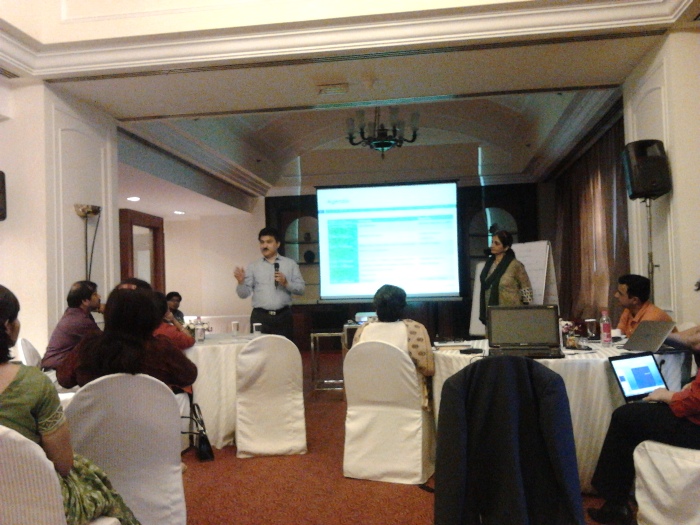Cyber Security & Safety for Adolescents, workshop for teachers, 2 May, 2013 at Hotel Hilton, Nehru Place, New Delhi
The workshop, conducted by Learning Links Foundation at the Hilton Hotel had several distinguished speakers on the panel, namely, Ms. Shweta Khurana, Head of the Asia Pacific Division, Intel; Mr. Alisher Umarov, Head of India/Bangladesh Division, UNESCO and Mr. Rakshit Tandon, Advisor on Cyber Security to state cyber cells of Delhi Police, UP Police and Haryana Police. In the audience were computer teachers and counsellors of notable Delhi schools, namely,
- Ramjas School
- St. Marys School, Dwarka
- St. Marys School, Safdarjung Enclave
- Modern School, Barakhamba
- Laxman Public School
- Sardar Patel Vidyalaya
- Army Public School, Dhaula Kuan and our School.
The objective of the workshop was to assemble feedback from teachers on how to train students in schools on Cyber Security so that Intel could develop a toolkit to equip students with the knowledge of safeguarding themselves from issues like Cyber bullying and stalking; Mobile Frauds and other negative aspects of social networking
Mr. Rakshit Tandon said that nowadays, students were living 2 lives one in the virtual world and the other in the real world. In the virtual world, on social networking sites like facebook, Twitter, Orkut, etc, they were getting involved in cyber bullying and stalking, using slanderous language ( like on the Confessions' Page on FaceBook). They had no fear as they are entirely ignorant of the law or that they can be easily caught. He used examples of cases which he had worked on during his collaboration with the cyber cells of various state police departments. Some cases he spoke of were
1. Surat case A 16 year old girl met a 26 year old man on Facebook and fell in love with him. After a month, the man called her and then kidnapped her and later demanded a 50 lakh ransom from her parents.
2. Jalandhar case An 18 year old girl committed suicide because obscene pictures of her were posted online.
3. A 10 year old boy stabbed another 10 year old due to a Facebook comment. The boy was being bullied.
4. A 13 year old boy hacked into a girls account and used her photographs to make a porn video and uploaded them on YouTube.
Due to several cases of cyber bullying, the High Court sent a notice to FaceBook questioning them about how they permit 13 year olds as members.
[gallery columns="2"]
Mr. Tandon also talked about how academically good students were indulging in online gambling as a part of online games. He told the audience that India is ranked 3rd in cyber bullying, as 53% of our students are involved in one or other form of cyber bullying. After narrating the above cases, he made the following suggestions for schools.
Educate students about the cyber law ( Indian IT Act 2008 ). He narrated an incident where he was speaking about the Act at a school, placing emphasis on section 66 of the Act which can be applied on juveniles. He had a policeman in uniform along with him, whose presence seemed to have helped make the required impact on the students; several of them came forward and confessed to being involved in some form of cyber- bullying.
Publicise the various cases of cyber bullying and inform, that if caught, can involves a punishment of 5 years and a 10 lakh fine.
Warn them against sharing their passwords/personal information with anybody.
Form a Cyber Cabinet consisting of a group of students who will counsel students about the negatives of social networking, identify any victim of cyber bullying and counsel him/her too.
Mr. Alisher Umarov spoke about how Indians are one of the largest communities on FaceBook (according to a study conducted by McAfee) and yet, we as Indians, never sensitize our children about internet security. 12-15 year old children are the most impressionable and should be told about it's dangers. This should be done by both parents and schools. The schools should also involve parents so that no communication remains between the students and their parents.
Both Mr. Tandon and Mr. Umarov reiterated that one of the primary functions of the internet is to share information so it is important to introduce students to information of websites which can help supplement their study material. If any student are interested in hacking then the interest should be nurtured so that they develop into professional and ethical hackers. Mr. Tandon explained that hacking is an upcoming profession and India presently requires a good number of ethical hackers. He also gave the example of one Shradha Sharma who used YouTube and social networking sites to publicise her music and became famous thereby enhancing her image.
Ms. Shweta Khurana expressed that Intel would be looking into all the above issues. She divided the audience into 3 groups and asked for feedback on the following questions :
1. How to involve students to create awareness on Cyber Security?
2. What should be the appropriate content in the toolkit?
3. What should be the role of schools in spreading awareness?
All teachers and counsellors gave the following views:
a) Students should be continuously sensitized about cyber bullying through seminars and workshops.
b) School students could teach other school students (Peer educators) about the hazards of cyber stalking, online banking frauds and cyber bullying.
c) Students must be told that all cyber crimes can be traced and nobody is above the law.
Learning Links Foundation would be developing a website soon where they would upload information and the ppt presented by Mr. Tandon so that students can access the same and understand the negative aspects of the internet. Intel would also be developing a framework on hacking which would be distributed to schools. Later they also plan to have an inter school Hackarthon Competition on the same framework.
Compiled by Ms. Meenu Kumar (Computer Dept.)













